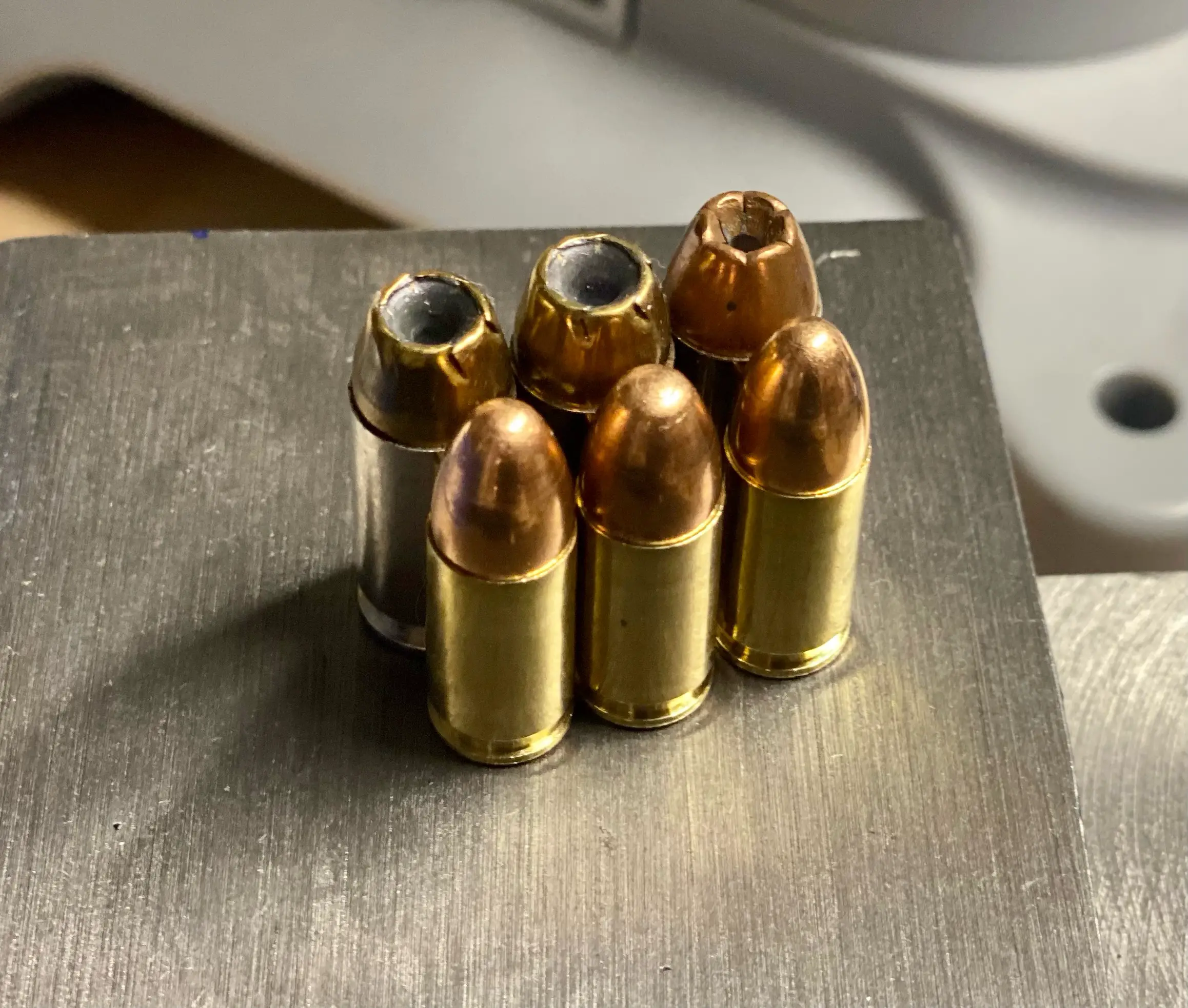If you’re new to firearms, you may be wondering about different types of ammunition for your gun.
Different types of ammo are only (mostly) appropriate for certain situations and use.
Range ammo is used for target practice. It is typically full-metal jacket, cheaper, and sometimes will have a lower grain making it lighter. Sometimes, reduced recoil to help you hone in accuracy and shooting fundamentals. Defense ammo is typically jacketed hollow points. Hollow points expand on impact, causing more damage.
In the rest of this article, I will explore what makes ammo range ammo and what makes ammo defense ammo.
I’ll also answer the question of whether range ammo can be used for self-defense.
Read on to better understand the distinction between these two types of ammunition.
The Anatomy of Range Ammo

There are many distinctions between range ammo and self-defense ammo.
One big difference a lot of newbies notice is the price of the ammunition.
You will be using a lot more of your range ammo.
This means that the price is a huge factor in your choice of range ammo.
Range ammo gets used more often because you will undoubtedly spend more time shooting at the range than in self-defense.
If you want your trips to the range to be as economical as possible, you should choose a very inexpensive round for trips to the range.
Going to the shooting range is already expensive. Running your everyday carry ammo through your weapon every time you go to the range will significantly increase the price of trips to the range.
While it may seem counterintuitive to practice shooting with a round you will not be carrying every day, finding a round for the range similar to your everyday carry ammo is straightforward.
It is vital to find a range round that is the exact grain as your everyday carry round.
This will make the shooting experience as similar to a real-world situation as possible.
This will keep you prepared and make your training more effective.
Many inexpensive rounds are lighter grain to keep them cheap.
But you should steer clear of these.
While they are more economical, they will hinder your training. Lighter grain rounds have less recoil and less ‘thump’ than heavier rounds.
If you train with light grain ammo and then carry a higher grain bullet, you will be less accurate with your everyday carry round.
The recoil will surprise you, and you will be inherently less effective in a combat situation.
Characteristics of Self-Defense Ammo

Both range ammo and self-defense ammo are jacketed metal rounds. They are both covered in metal.
The difference is that range ammo will be a full metal jacket, meaning the entire round will be solid and covered in metal.
Self-defense ammo is typically a jacketed hollow point.
This means that the round will be covered in metal, but the tip of the round will be “open”.
The end of the round is hollow to allow for more expansion of the bullet when it hits its target.
When a round hits a target and expands, this will inevitably do more damage to the target.
The expansion will create a much more significant hole in the target and stop the round from over-penetrating.
Those two factors are imperative in any self-defense situation.
Full metal jacket rounds that are used for range practice can be prone to over-penetration.
This means they will hit their target and continue to travel through it.
This minimizes the damage and will only create a small “hole” in the target.
This is very bad in a self-defense situation.
If you are under attack, you want to do as much damage as possible to the attacker as quickly as possible.
That is nearly impossible to do with a full metal jacket round.
Hollow point rounds are the best for self-defense because of the large amount of damage they do to their target.

The bullet will hit the mark and flatten on impact, causing the bullet to expand.
The expansion of the round will also serve to slow its momentum so that it stops when it hits the target instead of traveling through.
This will help you to incapacitate an attacker more quickly.
Hollow point rounds are the best for self-defense.
They cause the most damage, and the round has a higher likelihood of staying inside the target.
The fact that the round stays inside the target gives you a much better chance of doing harm to internal organs and tissue.
Can Range Ammo Be Used for Self-Defense?
While full metal jacket range ammo is not the best choice for self-defense, it is still a live round that can seriously injure or kill. While it may take an extra round or two to stop an attacker using range ammo, it can still be used for self-defense.
Any form of ammunition fired from a gun outside of blank ammunition has the potential to injure or kill.
Using a full metal jacket round for self-defense is not recommended due to over penetration and the lack of expansion, but the round is still deadly.
If you plan on using a full metal jacket round for self-defense, you must be highly accurate, as with all ammunition.
Shot placement is probably more imperative when using a full metal jacket round.
Picking what part of an attacker to shoot at and hitting that target will make you more effective when using full metal jacket rounds.
Conclusion
Range ammo and self-defense ammo are very different in how they behave once they hit a target.
Range ammo will penetrate the target and continue to travel through the target.
Self-defense ammo will hit the mark and expand. This will cause more damage to the target.
The expansion of self-defense rounds also slows the round down and prevents over-penetration.
The round will stay inside the target instead of just going right through like range ammo.
This will cause a lot more damage to any attacker or threat.

